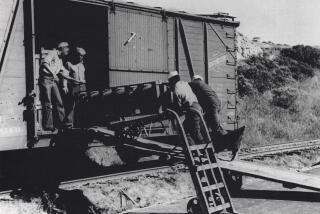‘Dismay’ on Nixon’s ’73 POW Stance Told : Vietnam aftermath: A Pentagon official tells of a list of 80 who were unaccounted for, when all captives were supposed to have been freed.
- Share via
WASHINGTON — The Pentagon official who was in charge of accounting for U.S. prisoners in Indochina said Thursday that he was “dismayed” by President Richard M. Nixon’s declaration in early 1973 that all American POWs had come home.
Although insisting the United States had no “hard evidence” that prisoners were left behind, the official conceded under questioning that the Pentagon had a list of about 80 servicemen who were believed to have been prisoners and were unaccounted for after April, 1973, when all POWs were supposed to have been freed.
On the second and last day of hearings by a Senate panel investigating the fate of Americans still listed as missing from the Vietnam War, Roger Shields, who was deputy assistant secretary of defense for POW-MIA Affairs from 1971 to 1977, defended his agency’s handling of the POW issue.
Shields’ remarks were in response to charges by Sen. John Kerry (D-Mass.), who had said that the Pentagon ignored evidence indicating that as many as 133 Americans were still in Vietnamese custody after April, 1973.
“This committee does not assert that every one of the 133 were alive . . . but we do assert that some were,” Kerry said.
Shields conceded the Pentagon knew that some men who had been held remained unaccounted for. But he insisted: “We had no current, hard evidence that Americans were still being held prisoners in Southeast Asia” after Operation Homecoming in April, 1973.
Under sharp questioning by Kerry and other members of the committee, however, Shields also admitted that the Pentagon had intelligence reports suggesting that some POWs were still in custody in Vietnam and Laos at a time when Nixon Administration officials from the President on down were saying publicly that everyone had been returned.
“I was dismayed at that statement,” Shields said of Nixon’s declaration, in March of 1973, that all POWs had been repatriated.
Kerry’s contention--based on a committee review of thousands of classified documents--that as many as 133 POWs could have been left behind was never seriously contested by any of the current or former State and Defense department officials who testified at the two-day hearing.
But attempts by several of the senators to suggest that Nixon Administration officials conspired to cover up the possibility that POWs were left behind produced frequently heated exchanges.
“To say that all prisoners of war had returned, as the President announced on the 29th of March (1973) . . . was wrong, and you knew it was wrong,” Kerry said.
Despite such exchanges, most senators agreed that nothing in the testimony or documents released during the hearings appeared to support the notion that there had been a government conspiracy to cover up knowledge of servicemen held in Southeast Asia.
That possibility, said retired Army Gen. John W. Vessey, who testified later, was “zero.”
Nevertheless, the hearings resurrected old but troubling questions about whether, in the political turmoil of the time, senior government officials were prepared to overlook the possibility that Americans were still held in Vietnam.
Citing a still mostly classified deposition taken earlier by the committee, Kerry confronted Shields with a transcript of an April, 1973, conversation that Shields had described with then-Deputy Defense Secretary William Clements, later governor of Texas.
According to the deposition, Clements told Shields in early April that “all American POWs are dead.” Shields objected, telling Clements: “We can’t say that.”
“You didn’t hear me,” Clements replied, according to the deposition. “I said they’re all dead.”
More to Read
Sign up for Essential California
The most important California stories and recommendations in your inbox every morning.
You may occasionally receive promotional content from the Los Angeles Times.









